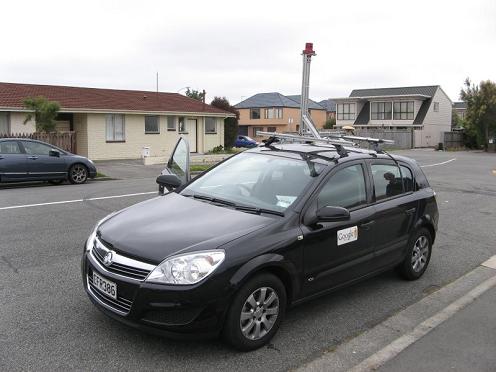
Google Street View car
There's no denying that Google Maps is the king of online mapping services. It may have been slightly late to the party, but thanks to social features like sharable maps and the ability to drop in notes at specific locations, it quickly zoomed past competitors like MapQuest.
One of Google Maps' most intriguing elements is its Street View feature, which was just given a user-friendly overhaul. But the road to success hasn't been entirely smooth for Street View, and now a French court has laid one more speed bump in its path.
A quick recap: Google Street View began focusing more attention on Europe last year, which made some folks across the pond a little jittery. (The Germans seemed particularly upset about privacy issues, though in the end, only a small percentage of the population opted out of the service.)
The situation got far worse when Google revealed that there was, indeed, some basis for everyone's concern. Google Street View vehicles, you see, were collecting three kinds of data as they rolled across the highways and byways: (a) pictures, which are stitched together to make what we know as Street View; (b) low-res 3D building images; and (c) names and addresses of open wifi networks.
The wifi networks served the same function as cell towers, allowing Google to more accurately pinpoint a user's location. So, if a user in Berlin pulled up Street View on his smartphone, and that phone could see not only a couple of cell towers, but also a particular wifi network, that helped Google triangulate his location with far more certainty. And when it comes to mapping, location certainty is key.
The problem: Google initially said that it was only collecting the names and addresses of those networks, but in fact, its rolling computers were also pulling private information from those networks -- information like, say, emails and passwords. Google apologized for the goof, promised to erase the data, and said that in the future, its Street View vehicles would no longer collect data on wifi networks. That satisfied many countries and courts: Britain and Canada, for example, found Google guilt of privacy invasion, but chose not to levy fines on the company, taking Google at its word.
The French, however, kept investigating. And what French courts found was that Google continued to use wifi data in its mapping services, even while it was in the process of deleting the information. And so, France's National Commission for Computing and Civil Liberties (CNIL) has now fined the company €100,000 ($142,000) -- the biggest fine the commission has levied since being given the power to do so in 2004.
Of course, in the grand scheme of things $142,000 isn't much of a penalty for Google -- probably just a couple of days' worth of panini in the Mountain View cafeteria. But in this economy, and in these days of heightened cyber-privacy concerns, it's more than enough to make a point.
[Mashable]
